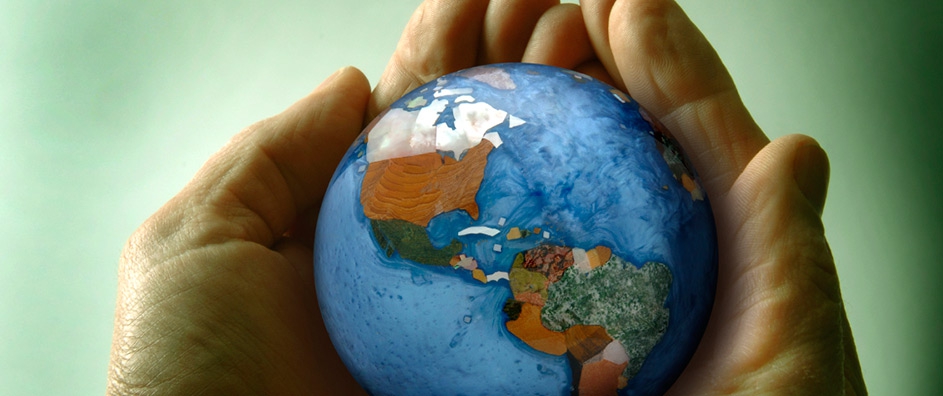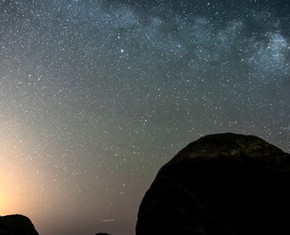The views expressed in our content reflect individual perspectives and do not represent the authoritative views of the Baha'i Faith.
The most remarkable feature of this historical moment on Earth is not that we are on the way to destroying the world—we’ve actually been on the way for quite a while. It is that we are beginning to wake up, as from a millennia-long sleep, to a whole new relationship to our world, to ourselves and each other. – Joanna Macy
The earth is one earth, and the same atmosphere surrounds it. – Abdu’l-Baha, The Promulgation of Universal Peace, p. 232.
We tend to think of scientists as purely rational and not very emotional—but scientists have feelings, too. Their work has serious emotional consequences, especially when it deals with global issues of extreme importance to all human beings. Many climate scientists, for example, struggle with anger, depression and grief when they witness the impact of climate change on the planet and its inhabitants:
I feel like nobody’s listening… I feel both exasperation and despair in equal measure, that perhaps there really is nothing I can do. I feel vulnerable. – Dr. Helen McGregor, Australian National University’s Research School of Earth Sciences.
As a human-being, and especially as a parent, I feel concerned that we are doing damage to the planet… I don’t want to leave a mess for my children, or anyone else’s children, to clear-up. – Professor Peter Cox, the University of Exeter.
Like many others I feel frustrated with the current state of public discourse and I’m dismayed by those who, seemingly motivated by their own short-term self-interest, have chosen to hijack that discussion. – Dr. John Fasullo, the National Centre for Atmospheric Research.
If you’d like to hear more from climate scientists about the profound emotional impact of their work, please take a look at these two interesting websites:
- Is This How You Feel? This compilation of comments and letters from highly credentialed Australian climate scientists and researchers doesn’t share the usual scientific papers and analyses—instead, it shares the scientist’s feelings about what they’ve witnessed.
- http://morethanscientists.org/ – This website introduces readers to videos of climate scientists and their families, and profiles their efforts to understand the profound changes occurring in the world, as well as sharing their emotions about those changes.
Personally, I found the letters and comments from these scientists moving and powerful. They made me think about the two aspects of our minds, the thinking and the feeling capabilities we all possess. Our rational minds constantly evaluate and analyze using facts and reason; while our emotions react based on a more intuitive, heart-centered basis. We usually need both to take any substantive action. In the case of climate change, because emotions and feelings help us relate to each other better, we need to increasingly utilize these two aspects of our humanity to try and understand the challenge that faces us.
So rather than relying solely on the constant flow of studies, data and information about climate change and its impact; let’s access the other parts of our humanity by beginning to actually discuss our feelings about the climate crisis with one another. I know, that isn’t easy, because climate change can challenge deeply-held convictions and world views, threaten the status quo and upset some people. The issue—even though it has nothing to do with partisan politics—has effectively been politicized by many different factions, the fossil fuel industry among them. Despite that sort of manufactured controversy, let’s all engage in more social interaction and consultation, along with a sharing of our inner thoughts and emotions. If you want to contribute to the success of the Paris Climate talks, but don’t know how, start here—by simply initiating the conversation about your feelings and emotions around the crisis the Earth faces.
If we can get beyond our opinions and honestly talk about how the prospect of a compromised future makes us feel, perhaps it will allow us to truly communicate rather than just talking past one another while citing dueling “facts.” Engaging others emotionally in that kind of real, authentic person-to-person exchange will promote understanding and cooperation at the personal and the local level. In turn, that understanding can then rise to a more universal one. Only that critical mass of shared worldwide concern will move our leaders to work together and act responsibly.
In the few days of the Paris COP21 Climate Change Conference, the world will continue its quest for agreement and unity on the crisis. But no one believes that the Paris Conference will solve it once and for all. Instead, Paris represents a fresh beginning, an opportunity for the nations of the world to demonstrate that they truly do take the future of their people to heart. On behalf of the global Baha’i community, the Universal House of Justice calls on every nation to unite to resolve the environmental crises of our modern age:
Until such time as the nations of the world understand and follow the admonitions of Baha’u’llah to whole-heartedly work together in looking after the best interests of all humankind, and unite in the search for ways and means to meet the many environmental problems besetting our planet …little progress will be made towards their solution. – from a letter to an individual Baha’i, October 1981.
















Comments
Sign in or create an account
Continue with Googleor